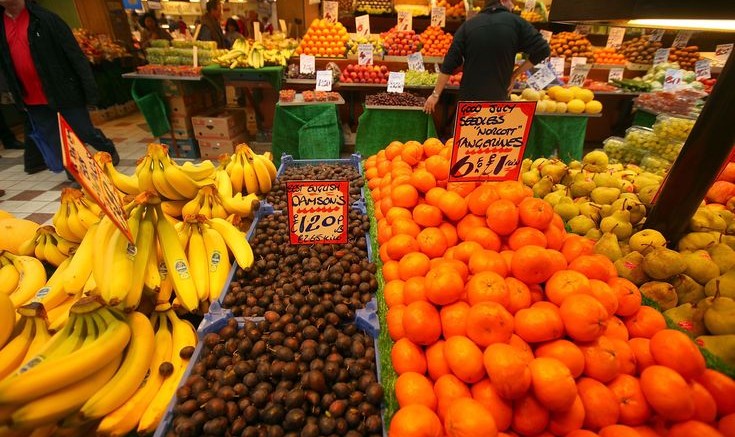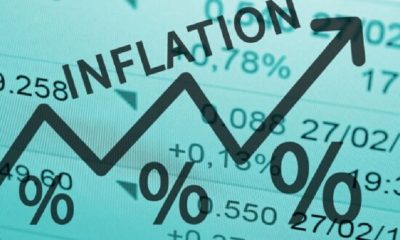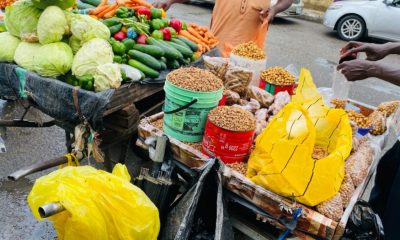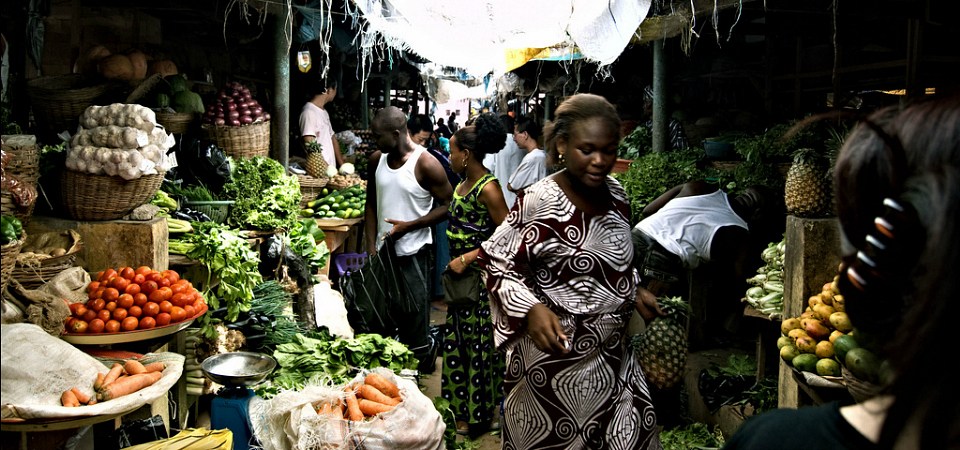Economy
Nigeria’s Inflation to Cool to 24.8%, GDP at 3.3% in 2024—World Bank
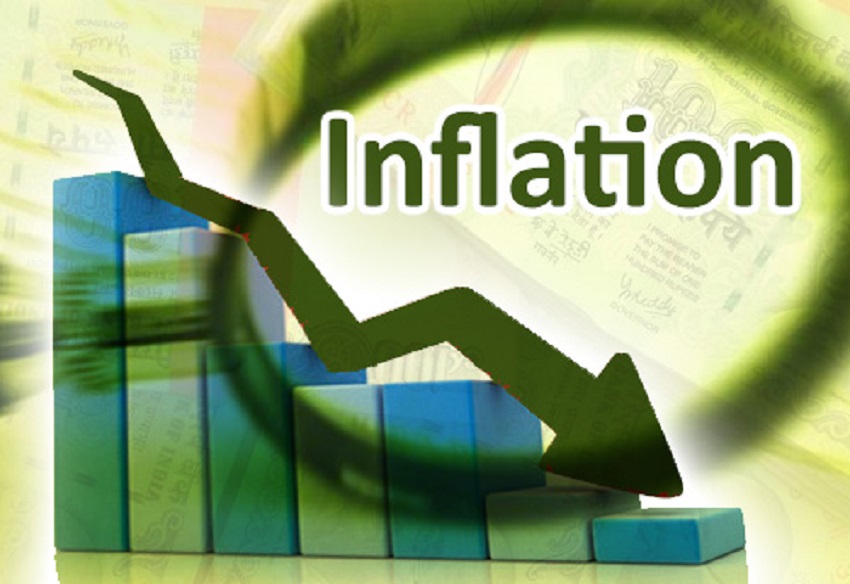
By Adedapo Adesanya
Nigeria’s inflation rate will drop to 24.8 per cent in 2024, and the Gross Domestic Product (GDP) is expected to expand by 3.3 per cent in the same year, the World Bank has revealed.
In its latest report released on Monday, the Bretton Wood institution said this would happen as inflation cooled in the Sub-Saharan part of Africa, where Nigeria belongs.
According to the most recent data from the National Bureau of Statistics (NBS), inflation increased by 31.7 per cent in February from 29.9 per cent recorded in January.
“Inflation is cooling in most Sub-Saharan African economies but remains high. The median inflation in the region is projected to fall from 7.1 per cent in 2023 to 5.1 per cent in 2024 and 5 per cent in 2025–26.
“The normalization of global supply chains, steady decline of commodity prices, and impacts of monetary tightening and fiscal consolidation are contributing to a lower rate of inflation in the region,” the World Bank stated.
Business Post recalls that the Governor of the Central Bank of Nigeria (CBN), Mr Yemi Cardoso, projected that inflation should moderate to 21.4 per cent this year.
In the report released yesterday, the World Bank cut down its economic growth forecast for the country for 2025 to 2026 by 0.1 per cent to 3.6 per cent from its January projection of 3.7 per cent.
“Growth in Nigeria is projected at 3.3 per cent in 2024 and 3.6 per cent in 2025–26 as macroeconomic and fiscal reforms gradually start to yield results,” it added.
“A more stable macroeconomic environment, as the reforms’ initial shock dissipates, will lead to sustained but still slow growth of the non-oil economy.
“The oil sector is expected to stabilize with recovery in production and slightly lower prices. Structural reforms will be needed to foster higher growth.
“Average inflation will remain elevated at 24.8 per cent in 2024, although it is expected to ease gradually to 15.1 per cent by 2026 on the back of monetary policy tightening and exchange rate stabilization,” it further said.
According to the World Bank, food inflation and the weakening of domestic currencies are still major drivers of inflation across countries in the Sub-Saharan Africa region.
“By February 2024, about one-third of the Sub-Saharan African countries with monthly available food price information (14 of 40 countries) had double-digit year-on-year rates of food inflation, with the fastest increases experienced in Ethiopia, Malawi, Nigeria, Sierra Leone, and Zimbabwe.”
It also noted that the rate of poverty reduction in the region is slow and that Nigeria and the Democratic Republic of Congo account for one in three of those living in extreme poverty.
“The region also faces the triple challenges of high extreme poverty, high inequality, and low transmission of growth to poverty reduction.
“The speed of poverty reduction has decreased tremendously since 2014. The rate of reduction was 3.1 per cent between 2010 and 2014, subsequently decreasing to 1.2 per cent between 2014 and 2019,” the World Bank said.
“In contrast, the rest of the world reduced extreme poverty on average by 9.2 per cent per year within the same time horizon, suggesting that the African region is falling further behind.
“In addition, there is substantial regional heterogeneity in where the poor are with Nigeria and the Democratic Republic of Congo accounting for one in three of those living in extreme poverty,” it stated, adding that the region can accelerate growth and poverty reduction substantially by tackling inequality, specifically structural inequality.
Economy
Champion Breweries Concludes Bullet Brand Portfolio Acquisition

By Aduragbemi Omiyale
The acquisition of the Bullet brand portfolio from Sun Mark has been completed by Champion Breweries Plc, a statement from the company confirms.
This marks a transformative milestone in the organisation’s strategic expansion into a diversified, pan-African beverage platform.
With this development, Champion Breweries now owns the Bullet brand assets, trademarks, formulations, and commercial rights globally through an asset carve-out structure.
The assets are held in a newly incorporated entity in the Netherlands, in which Champion Breweries holds a majority interest, while Vinar N.V., the majority shareholder of Sun Mark, retains a minority stake.
Bullet products are currently distributed in 14 African markets, positioning Champion Breweries to scale beyond Nigeria in the high-growth ready-to-drink (RTD) alcoholic and energy drink segments.
This expansion significantly broadens the brewer’s addressable market and strengthens its revenue base with an established, profitable portfolio that already enjoys strong brand recognition and consumer loyalty across multiple markets.
“The successful completion of our public equity raises, together with the formal close of the Bullet acquisition, marks a defining moment for Champion Breweries.
“The support we received from both existing shareholders and new investors reflects strong confidence in our long-term strategy to build a diversified, high-growth beverage platform with pan-African scale.
“Our focus now is on disciplined execution, integration, and delivering sustained value across markets,” the chairman of Champion Breweries, Mr Imo-Abasi Jacob, stated.
Through this transaction, Champion Breweries is expected to achieve enhanced foreign exchange earnings, expanded distribution leverage across African markets, integrated supply chain efficiencies, portfolio diversification into high‑growth consumer beverage categories, and strengthened presence in the RTD and energy drink segments.
The acquisition accelerates Champion Breweries’ transition from a regional brewing business to a multi-category consumer platform with continental reach.
Bullet Black is Nigeria’s leading ready-to-drink alcoholic beverage, while Bullet Blue has built a strong presence in the energy drink category across several African markets.
Economy
M-KOPA Nigeria Plans Expansion to Edo, Others After N231bn Credit Milestone

By Adedapo Adesanya
Emerging market fintech firm, M-KOPA, has announced plans to deepen its reach in Nigeria to the South South and South East regions, starting with Edo this year, after providing N231 billion in credit to over 1 million customers in the country.
The firm released its first Nigeria-focused Impact Report, which showed that Nigeria is M-KOPA’s fastest-growing market and fastest to reach the milestone.
Since its foray into the Nigerian market in 2019, M-KOPA has been working to dismantle barriers to financial inclusion by providing flexible smartphone financing and digital financial tools that align with how people in the informal economy earn and manage their money.
It operates in six states in the country, including Lagos, Ogun, and Oyo, among others.
The report highlights the company’s contribution to income generation, digital inclusion and economic opportunity for Every Day Earners across the country.
The report showed that M-KOPA has enabled 290,000 first-time smartphone users, while 56 per cent of agents accessed their first income opportunity through the platform.
It showed high income and livelihood gains among its users, with about 77 per cent of customers leveraging smartphones or digital loans obtained through the platform to generate income, indicating that access to financed devices is directly supporting micro-entrepreneurial activity and informal sector productivity.
Furthermore, 75 per cent of users report higher earnings since gaining access to M-KOPA’s services, suggesting measurable improvements in personal revenue streams. On the distribution side, 99 per cent of agents disclose increased earnings, reflecting positive spillover effects across the company’s value chain.
In addition, 81 per cent of long-term customers state that their household expenses have improved, pointing to enhanced financial stability and better consumption smoothing over time.
Speaking on the report, Mr Babajide Duroshola, General Manager, M-KOPA Nigeria, said, “Nigeria represents extraordinary potential, and we’re proud that it has become M-KOPA’s fastest-growing market. Our Impact Report shows that when Every Day Earners gain access to the right digital and financial tools, they use them to create stability and long-term progress for their families. This is about access that unlocks opportunity and sustained prosperity.”
On its expansion plans Nigeria-wide, the M-KOPA helmsman said, “Many of the states we are considering are already similar to the ones we are currently in proximity… So, there is proximity and similarity between these states, and that’s what we are going to do, starting with Edo.”
He noted that as M-KOPA Nigeria continues to expand, the focus remains on ensuring more everyday earners gain access to the digital and financial tools they need to build resilient, prosperous futures in Nigeria’s rapidly digitising economy.
Economy
Tinubu Okays Extension of Ban on Raw Shea Nut Export by One Year

By Aduragbemi Omiyale
The ban on the export of raw shea nuts from Nigeria has been extended by one year by President Bola Tinubu.
A statement from the Special Adviser to the President on Information and Strategy, Mr Bayo Onanuga, on Wednesday disclosed that the ban is now till February 25, 2027.
It was emphasised that this decision underscores the administration’s commitment to advancing industrial development, strengthening domestic value addition, and supporting the objectives of the Renewed Hope Agenda.
The ban aims to deepen processing capacity within Nigeria, enhance livelihoods in shea-producing communities, and promote the growth of Nigerian exports anchored on value-added products, the statement noted.
To further these objectives, President Tinubu has authorised the two Ministers of the Federal Ministry of Industry, Trade and Investment, and the Presidential Food Security Coordination Unit (PFSCU), to coordinate the implementation of a unified, evidence-based national framework that aligns industrialisation, trade, and investment priorities across the shea nut value chain.
He also approved the adoption of an export framework established by the Nigerian Commodity Exchange (NCX) and the withdrawal of all waivers allowing the direct export of raw shea nuts.
The President directed that any excess supply of raw shea nuts should be exported exclusively through the NCX framework, in accordance with the approved guidelines.
Additionally, he directed the Federal Ministry of Finance to provide access to a dedicated NESS Support Window to enable the Federal Ministry of Industry, Trade and Investment to pilot a Livelihood Finance Mechanism to strengthen production and processing capacity.
Shea nuts, the oil-rich fruits from the shea tree common in the Savanna belt of Nigeria, are the raw material for shea butter, renowned for its moisturising, anti-inflammatory, and antioxidant properties. The extracted butter is a principal ingredient in cosmetics for skin and hair, as well as in edible cooking oil. The Federal Government encourages processing shea nuts into butter locally, as butter fetches between 10 and 20 times the price of the raw nuts.
The federal government said it remains committed to policies that promote inclusive growth, local manufacturing and position Nigeria as a competitive participant in global agricultural value chains.
-

 Feature/OPED6 years ago
Feature/OPED6 years agoDavos was Different this year
-
Travel/Tourism10 years ago
Lagos Seals Western Lodge Hotel In Ikorodu
-

 Showbiz3 years ago
Showbiz3 years agoEstranged Lover Releases Videos of Empress Njamah Bathing
-

 Banking8 years ago
Banking8 years agoSort Codes of GTBank Branches in Nigeria
-

 Economy3 years ago
Economy3 years agoSubsidy Removal: CNG at N130 Per Litre Cheaper Than Petrol—IPMAN
-

 Banking3 years ago
Banking3 years agoSort Codes of UBA Branches in Nigeria
-

 Banking3 years ago
Banking3 years agoFirst Bank Announces Planned Downtime
-

 Sports3 years ago
Sports3 years agoHighest Paid Nigerian Footballer – How Much Do Nigerian Footballers Earn



